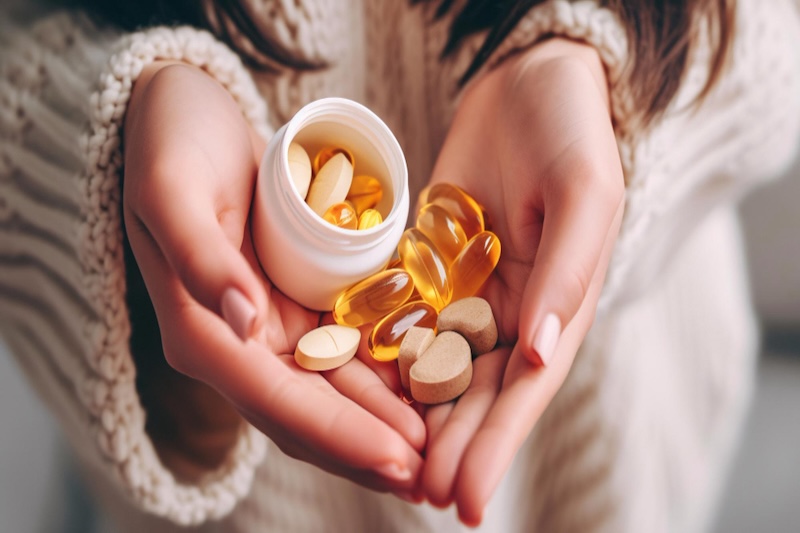
Imagine this: You’re in your late twenties, juggling a busy career, personal relationships, and the endless list of daily responsibilities. Amid all this chaos, your health—particularly your reproductive health—sometimes takes a backseat. Yet, it’s during this phase that setting a solid foundation can make a world of difference for your future fertility, hormonal balance, and overall well-being.
Women’s reproductive health is a complex interplay of hormonal regulation, nutrient sufficiency, lifestyle choices, and genetics. While a balanced diet and a healthy lifestyle form the cornerstone, sometimes supplements can serve as powerful allies in optimizing this delicate system. But with so many options out there—some backed by scientific evidence and others less so—how do you choose the best supplements tailored to your unique needs?
In this comprehensive guide, we’ll explore the most effective, evidence-based supplements for women’s reproductive health. Whether you’re planning to conceive, dealing with hormonal imbalances, or simply aiming to support your overall well-being, this deep dive will equip you with knowledge, expert insights, and practical advice to make informed choices.
Understanding Women’s Reproductive Health: A Foundation
Before jumping into supplement recommendations, it’s crucial to understand what reproductive health entails. It encompasses menstrual regularity, hormonal balance, fertility, pregnancy support, and overall gynecological health. Factors influencing it include genetics, age, lifestyle, diet, stress levels, and environmental exposures.
According to the World Health Organization, reproductive health is a state of physical, mental, and social well-being in all matters relating to the reproductive system. This holistic perspective underscores the importance of nurturing the body with essential nutrients and care.
Why Supplements Can Play a Vital Role
While no supplement can replace a balanced diet, they can fill nutritional gaps, support hormonal regulation, and enhance reproductive functions. For example, deficiencies in key micronutrients like folate, iron, or vitamin D can impair fertility and pregnancy outcomes. Moreover, some supplements possess antioxidant properties that combat oxidative stress—a factor linked to reproductive aging and fertility issues.
The key is to choose scientifically supported supplements tailored to your specific needs, whether you’re trying to conceive, managing hormonal imbalances, or aiming to maintain reproductive longevity.
Top Supplements for Women’s Reproductive Health: An In-Depth Look
Let’s explore the most researched and trusted supplements, understanding their benefits, recommended dosages, and considerations. Remember, always consult your healthcare provider before adding new supplements to your regimen.
1. Folic Acid (Vitamin B9)
Why it matters: Folic acid is perhaps the most well-known supplement for women planning pregnancy. It plays a critical role in DNA synthesis, cell division, and preventing neural tube defects in developing fetuses.
Scientific backing: The CDC recommends women of reproductive age to take 400–800 micrograms of folic acid daily, especially before conception and during early pregnancy. Adequate folate levels are linked to reduced risks of birth defects and improved pregnancy outcomes.
Sources: While supplements are most reliable, leafy greens, legumes, and fortified grains are natural sources. However, supplementation ensures consistent intake, especially in women with dietary restrictions.
Expert insight: The importance of folic acid extends beyond pregnancy—adequate levels are associated with improved ovarian reserve and hormone regulation.
2. Iron
Why it matters: Iron is vital for oxygen transport and energy production. Women of reproductive age are prone to iron deficiency anemia due to menstrual blood loss, which can lead to fatigue, impaired ovulation, and fertility issues.
Scientific backing: The World Health Organization highlights iron deficiency as one of the most common nutritional deficiencies worldwide. Supplementing iron during pregnancy reduces risks of preterm birth and low birth weight.
Sources: Lean meats, spinach, beans, and fortified cereals. Supplements are often recommended during pregnancy or in cases of deficiency confirmed through blood tests.
Expert insight: Iron absorption can be enhanced when taken with vitamin C-rich foods or supplements, but avoid taking it simultaneously with calcium, which can inhibit absorption.
3. Vitamin D
Why it matters: Vitamin D influences ovarian follicle development, hormone synthesis, and immune health. Deficiency has been linked to irregular menstrual cycles, PCOS (Polycystic Ovary Syndrome), and infertility.
Scientific backing: Research published in reproductive endocrinology journals suggests women with optimal vitamin D levels have better fertility outcomes. The Endocrine Society recommends maintaining serum vitamin D levels between 30-50 ng/mL.
Sources: Sun exposure, fatty fish, fortified dairy, and supplements. Many women, especially those in northern latitudes, may need supplementation.
Expert insight: Regular monitoring of vitamin D levels can help tailor appropriate supplementation and avoid deficiency-related reproductive issues.
4. Omega-3 Fatty Acids (EPA & DHA)
Why it matters: Omega-3s are essential for reducing inflammation, supporting egg quality, and promoting healthy hormone production. They also play a critical role during pregnancy in fetal brain development.
Scientific backing: Studies link omega-3 intake with improved ovulation, reduced symptoms of PMS, and better pregnancy outcomes. The American Pregnancy Association recommends a daily intake of at least 200-300 mg of DHA during pregnancy.
Sources: Fatty fish like salmon and mackerel, flaxseeds, chia seeds, and omega-3 supplements.
Expert insight: For vegetarians or vegans, algae-based omega-3 supplements provide an excellent alternative.
5. Coenzyme Q10 (CoQ10)
Why it matters: CoQ10 is a potent antioxidant involved in energy production within cells, including ovarian cells. It’s especially beneficial for women over 35 or those with fertility challenges.
Scientific backing: Clinical trials have shown CoQ10 supplementation improves egg quality and ovarian response in women undergoing assisted reproductive techniques.
Sources: Small amounts are found in organ meats, fish, and whole grains. Supplements are a concentrated form of this nutrient.
Expert insight: Doses typically range from 100 to 300 mg daily, but always consult a fertility specialist for personalized advice.
6. Myo-Inositol
Why it matters: Myo-inositol, a form of B-vitamin, supports insulin sensitivity and hormonal balance, especially in women with PCOS—a common cause of infertility.
Scientific backing: Multiple studies demonstrate improved ovulation, menstrual regularity, and metabolic health with myo-inositol supplementation.
Sources: Naturally found in fruits, beans, and grains; supplements provide a concentrated dose.
Expert insight: Combining myo-inositol with D-chiro-inositol enhances benefits, but dosages should be tailored to individual needs.
7. Vitex (Chaste Tree Berry)
Why it matters: Vitex is a herbal supplement traditionally used to regulate menstrual cycles, balance hormones, and support luteal phase health.
Scientific backing: Some studies suggest vitex can help women with luteal phase defects and PMS, though more research is needed.
Sources: Available as capsules or tinctures.
Caution: Always consult a healthcare professional before use, especially if you’re on hormonal medications or fertility treatments.
8. Probiotics
Why it matters: Gut health influences hormone metabolism, immune function, and inflammation—all factors impacting reproductive health.
Scientific backing: Emerging research indicates that probiotics can help manage conditions like bacterial vaginosis, yeast infections, and support overall reproductive tract health.
Sources: Fermented foods like yogurt, kefir, sauerkraut, or supplement formulations.
Expert insight: A healthy microbiome contributes to a balanced hormonal environment necessary for fertility.
Building Your Personalized Supplement Plan
While the above supplements have compelling evidence, it’s important to remember that each woman’s needs are unique. Factors such as age, health conditions, lifestyle, and existing nutritional deficiencies influence which supplements are appropriate.
Key steps to tailor your plan:
- Get tested: Blood tests can identify deficiencies in vitamin D, iron, and other key nutrients.
- Consult professionals: Talk to your healthcare provider or a registered dietitian specializing in women’s health.
- Prioritize quality: Choose reputable brands that undergo third-party testing for purity and potency.
- Start gradually: Introduce one supplement at a time to monitor your body’s response.
- Maintain a healthy lifestyle: Supplements should complement, not replace, a balanced diet, regular exercise, stress management, and adequate sleep.
Comparing Top Supplements for Women’s Reproductive Health
| Supplement | Main Benefits | Best For | Typical Dose | Key Considerations |
|---|---|---|---|---|
| Folic Acid | Prevents neural tube defects, DNA synthesis | Women planning pregnancy | 400–800 mcg daily | Start preconception; choose methylated forms if needed |
| Iron | Prevents anemia, supports energy, ovulation | Anemic or menstruating women | 18 mg daily (or as prescribed) | Take with vitamin C for better absorption |
| Vitamin D | Hormonal regulation, immune support | Deficient women, low sun exposure | 1,000–4,000 IU daily | Check levels regularly |
| Omega-3s | Reduces inflammation, supports egg quality | Women with inflammation, pregnancy planning | 200–300 mg DHA daily | Choose high-quality fish oil or algae-based sources |
| CoQ10 | Improves egg quality, cellular energy | Women over 35, fertility efforts | 100–300 mg daily | Consult your fertility specialist |
| Myo-Inositol | Supports PCOS, insulin sensitivity | Women with PCOS | 2–4 grams daily | Often combined with D-chiro-inositol |
| Vitex | Hormonal balance, cycle regulation | PMS, luteal phase support | 400–800 mg daily | Use under professional supervision |
| Probiotics | Gut and reproductive tract health | Overall reproductive health | Varies (daily supplement) | Choose strains like Lactobacillus and Bifidobacterium |
Frequently Asked Questions (FAQs)
Q1: Are supplements safe for everyone?
Most supplements are safe when taken as directed, but individual health conditions, medications, and allergies can influence safety. Always consult your healthcare provider before starting new supplements.
Q2: Can supplements replace a healthy diet?
No, supplements should complement a balanced diet rich in fruits, vegetables, whole grains, lean proteins, and healthy fats. They are not substitutes for good nutrition.
Q3: How long does it take to see benefits?
It varies. For example, folic acid benefits are immediate for neural tube development, but hormonal support from supplements like inositol or vitamin D may take several weeks to months to manifest.
Q4: Should I take multiple supplements together?
While some combinations are beneficial, stacking many supplements without professional guidance can lead to nutrient imbalances or adverse interactions. A personalized plan is best.
Q5: Are herbal supplements like vitex safe?
Herbal supplements can have potent effects. Always discuss with a healthcare provider, especially if you’re pregnant, breastfeeding, or on hormonal therapy.
Final Thoughts: Embrace a Holistic Approach
Supporting women’s reproductive health is a journey that combines science, lifestyle, and self-awareness. Supplements, backed by research, can be valuable tools—especially when tailored to your individual needs. But remember, they are most effective when integrated into a holistic health approach: balanced nutrition, regular physical activity, stress management, and routine medical checkups.
As you embark on or continue your reproductive health journey, consider partnering with healthcare professionals who can guide you based on your unique profile. Empower yourself with knowledge, make informed choices, and nurture your body with patience and care.
Your reproductive health is a vital part of your overall well-being—nurture it well, and it will serve you for a lifetime.
Next steps: Start by scheduling a health check-up, get your nutrient levels assessed, and explore which supplements might support your goals. Remember, every woman’s path is unique—trust your body, seek professional guidance, and embrace the journey toward optimal reproductive health.




